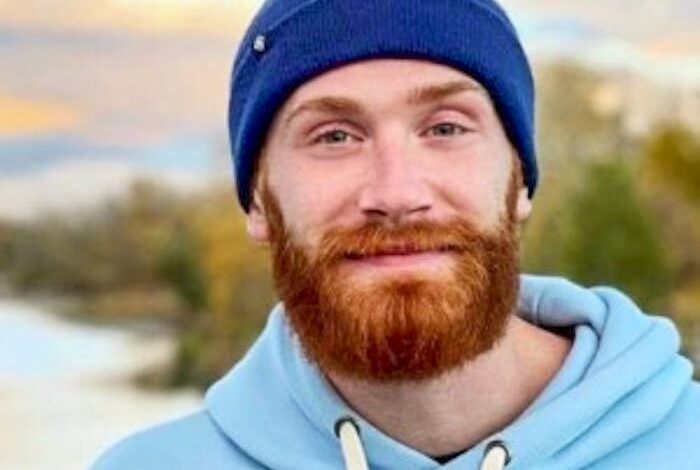Will a homeless Halifax man’s fight for benefits live on?

The Halifax man who died in hospital last month after overdosing in a Parade Square tent was fighting the province for better treatment for those living rough.
Bradley Lowe, who died Dec. 15, had retained the law firm of Pink Larkin to try to get the standard household rate of income assistance for people with disabilities. While he overdosed in front of Halifax City Hall, the 30-year-old, who struggled with his mental health and addictions, had been living in a tent then, more recently, an ice shelter at Victoria Park.
“As a person living in his tent in Victoria Park, he had only been receiving the $380 monthly rate for income assistance — what (the Department of Community Services) calls its ‘essentials’ rate,” Vincent Calderhead said in an email responding to questions about his late client.
“However, we were working with Bradley to apply for the full (standard household rate of $950 a month).”
Community Services rejected Lowe’s application for that full rate in October.
“When DCS rejected his application in October for the full rate, we appealed this decision to an appeal board,” Calderhead said.
“The matter was with the board for its decision at the time of Bradley’s tragic passing.”
That doesn’t necessarily mean Lowe’s appeal is done.
“Even though Bradley’s passing means that, even if the appeal were successful, there would now be no issue of ongoing payment, there would still be the matter of retroactive entitlement from the time of Bradley’s application,” Calderhead said.
“If the appeal were to continue, and it was successful, that retroactive benefit would go to his estate — in this case, his four-year-old son.”

The Halifax lawyer doesn’t know yet whether the assistance appeal board, which is independent of government, will choose to render a decision. “It’s likely that that will be decided sometime in January,” Calderhead said.
SaltWire asked Calderhead if Lowe wins his appeal, does that set a precedent for future appellants? And could it make it easier for others living rough to get the full rate?
“If the board were to continue with the appeal and if the appeal were successful, the decision could be cited by others,” Calderhead said, noting a board decision would be instructive though not binding on other boards that hear assistance appeals.
“So, yes, it might make it easier though the department wouldn’t be bound by a board decision to treat similar applications similarly.”
Food costs
At Lowe’s appeal hearing, Calderhead entered evidence showing that the cost of food alone is about $475 a month.
“And that is the cost for a person having their own food preparation and storage facilities available to them — none of which is available to someone living in a tent,” said the lawyer.
“The point being, someone in this situation would have to often buy prepared foods — considerably more expensive.”
In an interview Tuesday, Calderhead said if the assistance appeal board decides against making a decision in Lowe’s case, he could apply for a judicial review.
“That is to say, have a superior court review that decision by the board,” he said.
‘Shrouded in mystery’
In terms of practice, “it’s shrouded in mystery,” Calderhead said of the assistance appeal board.
“We don’t know whether all board members are provided with other decisions or even some decisions. Who knows?”
Calderhead, who specializes in human rights cases, said he offered decades back to help train new assistance appeal board members.
“I was never taken up on it,” he said.
While lawyers for the province give them some training, “who knows what it is? And more importantly, it’s from one perspective,” Calderhead said. “So that would be kind of like going to a criminal court where judges had only received training by the Crown.”
‘Any reason’
Community Services “looks for any reason to try and justify their decisions to cut back on what they give people,” said Claire McNeil, a lawyer with the Disability Rights Coalition.
The department has “developed policies over time so if you’re living in a tent trailer, if you’re couch surfing, if you’ve got any kind of not traditional housing arrangements, the department — it simply doesn’t compute for them,” McNeil said.
“They take the view that, in those situations, they think about the housing rather than the person’s needs. Whereas we would argue it should be about the person’s needs first.”

Every year the province fails to give people on social assistance cost of living increases, “which has been for quite a few years, they’re effectively cutting back on what they give people, so it obviously isn’t driven by an objective assessment about what people need to survive,” said McNeil.
‘Fighting chance’
Most people who appear in front of the assistance appeal board don’t have a lawyer, she said.
“In those cases, it’s rarely successful. But if you have the rare privilege of having an advocate with you, then you actually have a fighting chance. The difficulty is it’s not an individual problem,” McNeil said.
“The department’s often quite content for there to be one or two exceptions because of board decisions. But they won’t change their policy. Nothing will change. The system will continue on for the other thousands and thousands of people in that situation unchanged. A decision in an individual case does not change government policy.”
She said she hopes Lowe’s choice to challenge the policy regarding how much the province pays in assistance to folks living rough can change that.
“It’s a tragic situation and it will be too late for Bradley, whatever happens. But hopefully there will be a finding by the board that will influence government departmental policy going forward.”
‘Definitely needed’
McNeil has never fought a case like this for people living in encampments.
“But it’s definitely needed,” she said.
“The problem is not going away from the lack of affordable housing, and so people are being really forced to make these choices, opting for non-traditional forms of housing, and the governmental department policy is not keeping up with people’s reality.”
Assistance appeal board decisions aren’t available publicly, she said.
McNeil stressed the importance of having the province respond to findings made by the assistance appeal board.
‘Better transparency’
“You do it through better transparency in the appeal process,” she said.
“The department says, ‘Oh, we’re protecting people’s privacy. We don’t want to release decisions.’ But there are ways around that.”
Courts routinely release decisions where people are identified only by initials.
McNeil would like to see the same thing happen with decisions coming out of the assistance appeal board “in a way that would protect the individual but also make it a more rigorous system of law so that people knew what they were entitled to.”
Even individual board members don’t know what other boards have decided, she said.
“So that whole system is designed to only kind of deal with piecemeal problems one by one in isolation, rather than looking at the overall rules, policies and practices that are leading to these people being denied their legal entitlements.”
‘Many people have died’
The more light shed on the matter, the better, she said.
“Many people have died on the streets and not a lot of attention (has been) paid to the background stories,” McNeil said.
“We don’t want to stigmatize Bradley, but it’s great that his story is told.”
Assistance appeal board decisions should “clearly” be made public, said Wayne MacKay, a professor emeritus at the Schulich School of Law at Dalhousie University.
“As long as there’s not a privacy issue, why wouldn’t you make them public?” MacKay said. “There’s certainly a lot of legitimate public interest in how we’re treating the homeless, and the very difficult circumstances of people living in tents. And we’re claiming, at all levels of government — municipal, provincial and federal — to be concerned and doing everything we can about this. So, I think there’s a great deal of public interest in that, and yes, it should be public for sure.”

If there’s a child living, as in the case of Bradley Lowe, an appeal “shouldn’t necessarily disappear just because the person (appealing the decision) has died,” MacKay said.
He sees little sense in the policy that provides people with less financial assistance if they’re living rough.
“It seems to me that’s a technicality getting in the way of the substance of what they’re trying to do,” MacKay said.
“They’re trying to support and help these people. If anything, you need it that much more because you’re in a tent.”
SaltWire gave Community Services more than five hours Tuesday to answer questions about the matter. A department spokeswoman failed to respond with any answers.




